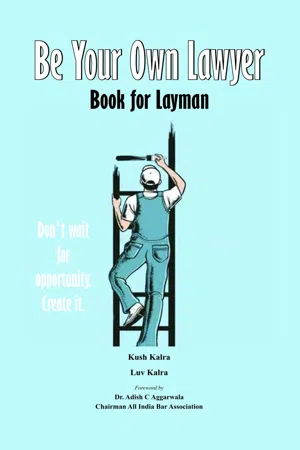
- 352 pages
- English
- ePUB (mobile friendly)
- Available on iOS & Android
Be Your Own Lawyer
About This Book
It is essential for the layman to have at least a broad prospective of the provisions of law which come into play in our daily lives and work. The Lay reader will surely find this book very useful as the most interesting judgments of courts are put in this book in a very simple and effective manner. One can profitably read through this book and also dip into its pages when confronted with a legal problem." Be Your Own Lawyer" book is an attempt to provide a forum for discussion and debate on all kinds of legal and social issues that confront us today. In the first issue of the book varied subjects like Criminal Law, Constitution Law, Right to Information, Civil law and Family Law have been covered. Various Judgments of Courts are presented in this book which will help common man in their day to day life. This book will be an asset for all those who are keen to know about Law.
Frequently asked questions
Information
Divorce1
Minor 1
Table of contents
- Cover
- Halfitle Page
- Title Page
- Copyright Page
- Acknowledgements
- Contents
- Foreword
- Preface to the First Edition
- List of Abbreviations
- Family Law
- 1 Abortion Without Consent is A Ground For Divorce
- 2 Benefit of Maintenance Cannot be Denied to Minor
- 3 Infertility is Not a Ground for Divorce
- 4 Muslim Girl Can Marry At the Age of 15 without the Parental Consent
- 5 Marriage with Minor under Hindu Law
- 6 DNA Test and Powers of the Court
- 7 Women can get Divorce if Husband Aboard
- 8 Cruelty by Wife
- Criminal Law
- 9 Acid Throwers May Get Life Sentence
- 10 Live-in Relationships among adults fine
- 11 Duty of Husband to Protect His Wife when harrased by In-Laws
- 12 Indian Committing Crime abroad can be tried in India
- 13 Bail is the Rule Jail is an Exception
- 14 Citizens need not be Coward
- 15 Right to Life includes Right to live with Human Dignity
- 16 Senior Citizens held for Playing Cards
- 17 Right to life includes right to marriage
- 18 Abuse of the Process of Courts
- 19 De-criminalisation of consensual - same - sex acts
- 20 Duty of driver in case of accident and injury to a person
- 21 Methods of Executing Death Sentence
- 22 Every doctor has professional duty to protect human life
- 23 Arresting a woman in night in absence of lady police
- 24 Phone Tapping
- 25 Guidelines regarding Ragging
- 26 People Charged for Minor Offences Languishing in Jails
- 27 Right against self incrimination
- 28 Duty of care by 5 star hotels
- 29 Do’s and Don’t’s under Armed Forces Special Powers Act, 1958
- 30 Impounding of Passport
- 31 Parents will Pay if Minor Causes Accident
- Constitution Law
- 32 No School if Building Not Fire-safe
- 33 Caste of a person depends upon birth
- 34 Freedom of Speech & Right to Fly National Flag
- 35 Right to Sleep
- 36 No use of fire crackers in silence zone
- 37 Public Trust Doctrine
- 38 Fundamental Right to Education
- 39 Eleven Guidelines to be followed in all cases of Arrest and Detention
- 40 Any member of public acting bona fide can file writ petition
- 41 Banning Slaughter of Cows
- 42 Sexual Harassment of Women at Workplace
- 43 What Cricket Means to India
- 44 Handcuffing should not be forced on Prisioners
- 45 Capitation Fees
- 46 Prohibition of Smoking in Public Areas
- 47 Who can File a PIL
- 48 Working Hours of child not more than four to six hours a Day
- 49 Right of the employer to terminate the services of Permanent Employees
- Civil Law
- 50 Hawking and Vending a Fundamental Right
- 51 Medical negligence and the liability of Medical Professionals
- 52 Death due to Pothole and Maintenance of Roads
- 53 No one shall be imprisoned merely on the ground of inability to fulfill a contractual obligation
- Right to Information
- 54 Under RTI Candidate is Entitled to have a Copy of Answer Sheet
- 55 RTI do not apply to Judgments
- Miscellaneous (Right to Education, Consumer law)
- 56 Court Cannot Award Marks
- 57 Non Lawyers Can appear for others under Consumer Protection Act (CPA)